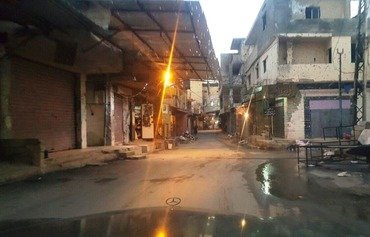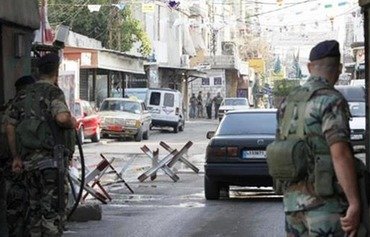The recent surrender of a number of wanted extremists in Ain al-Hilweh, a Palestinian refugee camp south of the Lebanese city of Sidon, is an important step in improving security and curbing extremist expansion, experts told Al-Mashareq.
During the first week of August, several supporters of radical imam Sheikh Ahmed al-Assir turned themselves in, led by Mohammed Abdul Rahman Shamandar, the brother of former singer and al-Assir follower Fadl Shaker.
Mohammed Tawfiq Taha, the son of al-Qaeda-linked Abdullah Azzam Brigades commander Tawfiq Taha, turned himself in to Lebanese army intelligence on August 8th, as did Hussein Mahmoud Darwish, who is accused of links to Jund al-Sham, an extremist group fighting in Syria that has ties to al-Qaeda.
This is "not the first time that elements who are part of terrorist organisations have turned themselves in to the Lebanese army's intelligence service", said Regional Forum for Consultancy and Studies director Brig. Gen. Khaled Hamade, a retired Lebanese military officer.
After Taha gave himself up to army intelligence at a checkpoint near Sidon Governmental Hospital, the number of fugitives who have turned themselves in to Lebanese security agencies has risen to 10, he told Al-Mashareq.
No recourse for fugitives
Since al-Assir's arrest at Beirut airport last August as he attempted to flee the country, and his subsequent prosecution, extremist elements connected to him have been surrendering to Lebanese forces, Hamade said.
"Other elements of terrorist organisations who have come into the camp understand that they have no possibility to escape from it and can therefore only surrender themselves to the Lebanese services," he said.
This includes "Islamic State of Iraq and the Levant" (ISIL) elements, he noted.
Hamade said the growing number of fugitives turning themselves in to the authorities can be attributed to both "new security formations in the camp" and the dwindling funding many extremist groups are facing.
The camp's internal security apparatus has recently undergone fundamental changes, he said, which include a new director of intelligence and an overhaul of procedures.
This has led to better security in the camp and an improved relationship with the Lebanese authorities, he added.
Wanted extremist elements escaping other camps, such as Yarmouk on the outskirts of Damascus, infiltrated Ain al-Hilweh before they were included on the official list of wanted fugitives, he said.
They have since been included on the list, he said, noting that their names have been circulated in the camp and there has been a positive response from Palestinian security forces inside the camp with regard to turning them in.
'Serious security initiatives'
"There are very serious security initiatives in Ain al-Hilweh camp with regard to turning in terrorist elements to the official services," Future Movement member Rached Fayed told Al-Mashareq.
These are designed to prevent the camp from descending into chaos due to internal, external and regional tensions, he added.
"After having seen a number of elements of terrorist organisations surrender themselves to the security forces, we could be expecting more of them," he said, noting that this is a "good step that reflects positively on the security of the camp in particular and Sidon, the south, and Lebanon in general".
"However, it should be noted that although there are elements who have joined or announced their allegiance to ISIL, [the former] al-Nusra Front (ANF), and other terrorist organisations, we are not talking about huge numbers," he said.
Extremist elements and sympathisers who might seek to disrupt security have not been a "major issue" in the camp, field reporter Nazih Naqouzi told Al-Mashareq.
The arrests and voluntary surrender to the security services of several wanted men is part of a plan developed by the Palestinian forces in the camp, he said.
As a result of this plan, he said, they have largely succeeded in handling the security warnings they have received about extremist plots, most notably those of ISIL, which seeks to expand its presence inside the camp.
The warnings included the expansion of ISIL's sympathiser base, especially after several individuals who left to fight with ISIL in Syria returned to the camp, he said.
"Those who have turned themselves in to army intelligence in the south are fourth or fifth rank and do not constitute a threat to the camp, as they are not security leaders or in positions of responsibility," Naqouzi said.
However, the information they provide upon their capture or surrender is bound to help expose others, he added, including those who are in senior positions.

![Lebanese army soldiers watch as an ambulance leaves the Ain al-Hilweh Palestinian refugee camp near Lebanon's southern port city of Sidon in August 2015. [Mahmoud Zayyat / AFP]](/cnmi_am/images/2016/08/26/6086-lebanon-hilwa-refugee-600_384.jpg)





